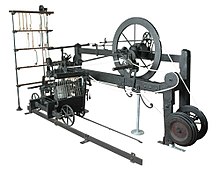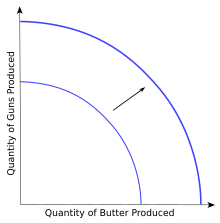Technological revolution
It is a time of accelerated technological progress characterized by innovations whose rapid application and diffusion typically cause an abrupt change in society.
It may potentially impact business management, education, social interactions, finance and research methodology, and is not limited to technical aspects.
For example, the use of coal as an energy source have negative environmental impacts, including being a contributing factor to climate change and the increase of greenhouse gases[3] in the atmosphere, and have caused technological unemployment.
[11][12] The phrase Fourth Industrial Revolution was first introduced by Klaus Schwab, the executive chairman of the World Economic Forum, in a 2015 article in Foreign Affairs.
[13] Following the publication of the article, the theme of the World Economic Forum Annual Meeting 2016 in Davos-Klosters, Switzerland was "Mastering the Fourth Industrial Revolution".
Schwab expects this era to be marked by breakthroughs in emerging technologies in fields such as robotics, artificial intelligence, nanotechnology, quantum computing, biotechnology, the internet of things, the industrial internet of things (IIoT), decentralized consensus, fifth-generation wireless technologies (5G), 3D printing and fully autonomous vehicles.
[16] Jeremy Rifkin includes technologies like 5G, autonomous vehicles, Internet of Things, and renewable energy in the Third Industrial Revolution.




